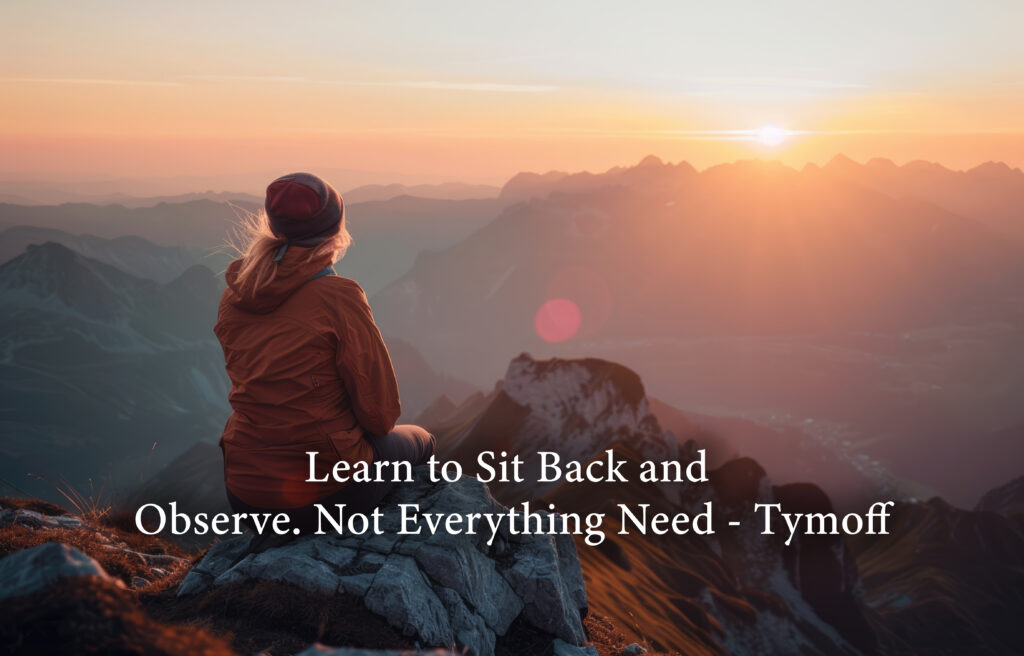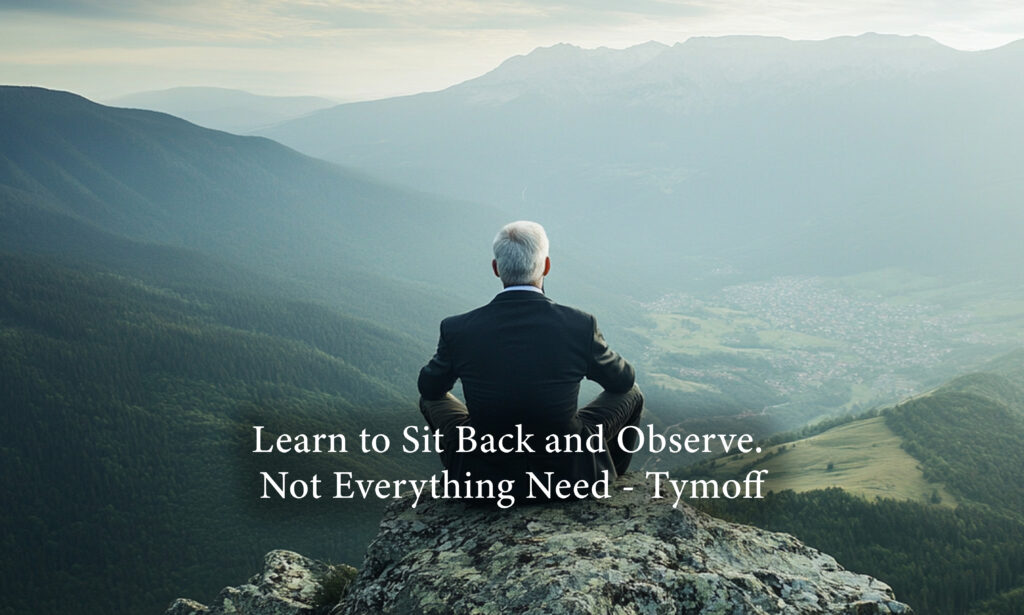In a world that seems to thrive on instant reactions, constant movement, and rapid decision-making, it’s easy to feel overwhelmed. But there is wisdom in the saying “learn to sit back and observe. not everything need – tymoff.” This phrase reminds us that not every situation requires immediate action, and sometimes the best thing you can do is to take a step back and simply observe. In this post, we’ll explore the importance of adopting this mindset and how it can positively impact your life in many ways.
By embracing the concept to “learn to sit back and observe. not everything need – tymoff,” you will not only gain new perspectives but also learn how to approach situations with patience and clarity. This approach encourages thoughtful decision-making and helps reduce stress, which ultimately leads to more balanced and effective outcomes. Whether in your personal relationships, your career, or everyday interactions, taking the time to observe before jumping into action can be incredibly powerful.
Table of Contents
Why It’s Important to Learn to Sit Back and Observe
The idea behind “learn to sit back and observe. not everything need – tymoff” is based on the belief that not every moment requires your immediate reaction. In fact, jumping into situations without fully understanding them can often lead to mistakes or unnecessary stress. By learning to observe first, you give yourself the opportunity to gather information, reflect on the situation, and make more informed decisions.
For instance, imagine you’re in a meeting where tensions are rising between colleagues. Instead of jumping into the argument, take a moment to observe. You might notice key details—such as body language, emotional tone, or unspoken cues—that can guide your response more effectively than if you acted right away. By observing, you allow yourself to think more clearly and respond more appropriately.
Furthermore, sitting back and observing allows you to understand situations from a broader perspective. You see things you might otherwise miss if you were caught up in the heat of the moment. When you “learn to sit back and observe. not everything need – tymoff,” you become more aware of both your surroundings and your internal state, leading to better control over your actions and emotions.
Benefits of Observing Before Acting
When you “learn to sit back and observe. not everything need – tymoff,” the benefits are clear. First and foremost, it allows for better decision-making. Rushing into decisions without observing the full picture can lead to regrets or unintended consequences. By pausing to observe, you gather more information and develop a clearer understanding of the situation.
Additionally, observing first reduces stress. Constantly feeling the need to react to every situation can be exhausting. But when you learn to sit back and observe, you give yourself a moment to breathe, which can help ease anxiety and allow you to approach situations more calmly. This can be especially beneficial in high-stress environments, such as at work or in personal relationships, where acting impulsively can lead to misunderstandings or conflict.
Taking a step back also enhances your emotional intelligence. By watching how others react and understanding their emotional cues, you develop better empathy and become more attuned to their needs. This is especially useful in personal interactions. When you “learn to sit back and observe. not everything need – tymoff,” you gain a greater capacity to listen, understand, and respond in a way that strengthens your relationships.

How to Practice the Art of Observing
Adopting the mindset to “learn to sit back and observe. not everything need – tymoff” takes practice, but it’s something you can incorporate into your daily life. Here are some practical steps to get started:
- Pause Before You Speak or Act: The next time you feel compelled to respond to a situation, take a deep breath and pause for a few seconds. This small act of mindfulness allows you to step out of reactive mode and into a more thoughtful state of mind. This brief pause can make a huge difference in how you handle the situation.
- Reflect on What You See: When you take a step back, make sure to fully observe what’s happening around you. Pay attention to the people involved, the environment, and your own emotional responses. What are people saying? What do their body language and tone suggest? How do you feel, and why? These reflections will give you insights that can guide your actions more effectively.
- Ask Questions, Don’t Jump to Conclusions: One way to avoid the urge to act quickly is to ask questions. Instead of assuming you know what’s happening, ask for clarification or more information. This practice not only helps you gather the facts but also encourages a more thoughtful approach.
- Embrace Patience: Learning to sit back and observe requires patience. Sometimes, it feels more natural to dive into a situation and try to fix it. But by exercising patience, you give yourself and others the time to process, reflect, and make more grounded decisions. Remember that you don’t have to solve everything immediately.
How Observation Leads to Growth
By learning to adopt the idea that “learn to sit back and observe. not everything need – tymoff,” you open yourself up to personal growth. Observation leads to self-awareness, which is key to improving in all areas of life. When you take time to observe, you can better understand your own patterns of behavior, emotional triggers, and thought processes.
Additionally, observing the actions of others allows you to learn from their successes and mistakes. By watching how others handle situations, you can gain insights into what works and what doesn’t. This knowledge can then be applied to your own life, helping you make more informed choices in the future.
In both personal and professional settings, taking the time to observe fosters growth and development. It helps you build stronger relationships, make better decisions, and handle challenges with greater resilience. Ultimately, adopting the philosophy of “learn to sit back and observe. not everything need – tymoff” sets you on a path toward greater success and personal fulfillment.
Conclusion: Embrace the Power of Observation
In conclusion, when you “learn to sit back and observe. not everything need – tymoff,” you gain the ability to navigate life’s challenges with more grace and wisdom. Rather than feeling the pressure to act in every situation, you give yourself the freedom to step back, reflect, and choose the best course of action. This approach not only reduces stress but also leads to better decision-making and stronger relationships.
So, the next time you find yourself in a tense situation, remember this simple yet powerful phrase: learn to sit back and observe. not everything need – tymoff. By doing so, you’ll discover a calmer, more thoughtful way of living that allows you to thrive in both your personal and professional life.
READ MORE : Understanding 127.0.0.1:57573: A Guide to Localhost and Ports


